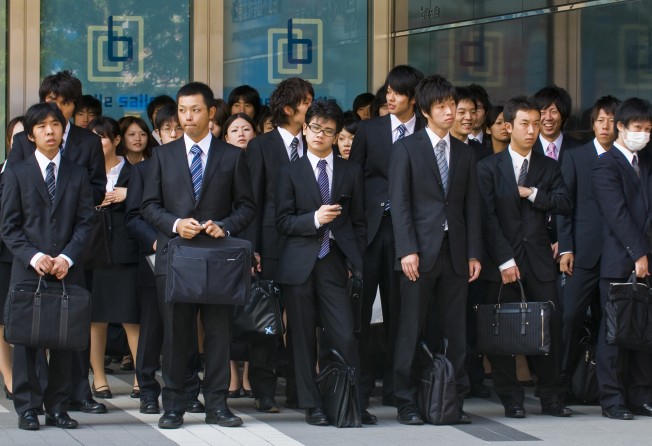
Microsoft Japan reports 40 per cent sales boost after four-day work week trial, but will it catch on in overworked country?
- During the August trial, the IT company said staff took 25 per cent less time off and there were significant declines in electricity and paper consumption
- But the idea of a shorter work week has already been trialled and even implemented in other companies

In a country notorious for overworking, Microsoft Japan trialled a radical idea: working less. And it found that four-day weeks and other reforms both boosted sales and cut costs.
The Japanese unit of the US IT giant closed its offices every Friday in August, giving all 2,300 full-time workers special leave.
It also restricted meetings to five people and a maximum of 30 minutes, and encouraged online chat platforms over emails and face-to-face communications.
The results, the company announced, were a 40 per cent increase in sales per employee in August, compared with a year earlier; staff took 25 per cent less time off; and there were significant declines in electricity and paper consumption.
Electricity usage was down 23 per cent in the office, and employees printed 59 per cent fewer pages of paper.

But the benefits weren’t only for the company. The vast majority of employees – 92 per cent – said they liked the shorter week, according to Microsoft.
“Work a short time, rest well and learn a lot,” Microsoft Japan president and CEO Takuya Hirano said. “I want employees to think about and experience how they can achieve the same results with 20 per cent less working time.”
Microsoft concluded that the trial showed “employees want to have a variety of ways of working” and that adopting the model more broadly could boost efficiency.
But it was not the first time long weekends have been experimented with in the corporate world. In 2018, New Zealand trust management company Perpetual Guardian trialled a four-day work week over two months for its 240 staff members. Employees reported experiencing better work-life balance and improved focus in the office. Their stress levels decreased by 7 per cent.

Since making the change to a 30-hour week permanent in November last year – on an opt-in basis – the New Zealand company has reported a big productivity increase, with staff spending less time surfing the internet, Reuters reported.
“I’m doing this as a businessman, not because I want people to have a nice life,” said Perpetual Guardian founder Andrew Barnes. “Business is slowly coming to the realisation that if one in four of your staff is stressed or has a mental health problem, that is not productive.”
Barnes, who has now set up a foundation to fund research into the four-day week and the future of work, said his company’s productivity, revenues and profits had been boosted since the four-day week was introduced.
If people see a leader who is not taking four days a week, they think: ‘If I take up this policy, I won’t get to the top
He said productivity had risen 30-40 per cent, while internet surfing dropped 35 per cent in office hours, and meetings became shorter and more efficient.
Barnes added that staff loyalty had increased, stress levels and sick days had fallen and the company was able to attract higher quality recruits.
Barnes’ four-day week is mandatory for senior managers at the company to prevent working hours creeping up again.
“If people see a leader who is not taking four days a week, they think: ‘If I take up this policy, I won’t get to the top’,” he said.
There have been multiple pieces of research into reducing office hours. A survey of 1,500 workers and 600 human resources managers by global HR consulting firm Robert Half found 66 per cent of workers wanted to work less than five days a week. A Harvard Business Review study showed shorter work days, from an eight-hour work day to a six-hour day, led to increased productivity. A 2018 survey of 3,000 employees by the Workforce Institute at US firm Kronos found more than half of full-time workers thought they could do their job in five hours a day.

But critics of a shorter working week have said it is not suited to all sectors and can be difficult and costly to implement.
Responding to the UK opposition Labour party’s pledge to introduce a 32-hour week if elected, think tank the Centre for Policy Studies said in a report on Tuesday that the policy could cost up to 17 billion pounds (US$21.94 billion).
But back in Japan, where karoshi – death from overwork – is an issue and overworked and overburdened couples opt not to have children, despite the country’s shrinking population, Microsoft’s successful trial may just catch on.
The government has been pushing for more “flexible work styles”, urging business to accept telecommuting, different part-time schedules and off-peak commuting.
The IT company, meanwhile, plans to launch a similar programme this winter – but will not offer special leave. Instead, employees will be encouraged to use their existing holiday days, it said.